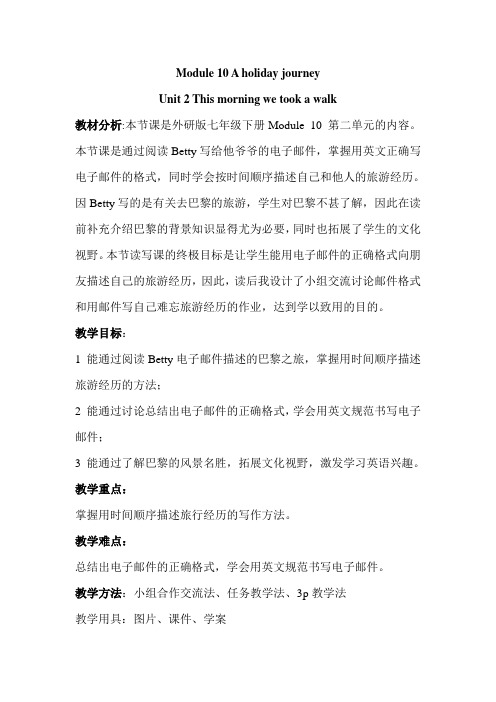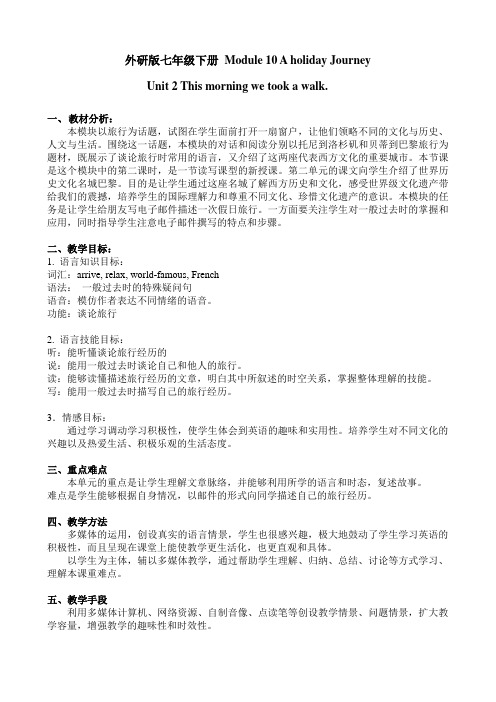外研版七年级英语下册第十模块第二单元Microsoft Word 文档 - 副本
- 格式:doc
- 大小:47.50 KB
- 文档页数:4


Module 10 A holiday journeyUnit 2 This morning we took a walk教材分析:本节课是外研版七年级下册Module 10 第二单元的内容。
本节课是通过阅读Betty写给他爷爷的电子邮件,掌握用英文正确写电子邮件的格式,同时学会按时间顺序描述自己和他人的旅游经历。
因Betty写的是有关去巴黎的旅游,学生对巴黎不甚了解,因此在读前补充介绍巴黎的背景知识显得尤为必要,同时也拓展了学生的文化视野。
本节读写课的终极目标是让学生能用电子邮件的正确格式向朋友描述自己的旅游经历,因此,读后我设计了小组交流讨论邮件格式和用邮件写自己难忘旅游经历的作业,达到学以致用的目的。
教学目标:1 能通过阅读Betty电子邮件描述的巴黎之旅,掌握用时间顺序描述旅游经历的方法;2 能通过讨论总结出电子邮件的正确格式,学会用英文规范书写电子邮件;3 能通过了解巴黎的风景名胜,拓展文化视野,激发学习英语兴趣。
教学重点:掌握用时间顺序描述旅行经历的写作方法。
教学难点:总结出电子邮件的正确格式,学会用英文规范书写电子邮件。
教学方法:小组合作交流法、任务教学法、3p教学法教学用具:图片、课件、学案教学步骤:Step1 Free talk (3 mintues)T: May Day has gone, I went to Fu Shui to pick up strawberries. Where did you go?S:I went to……T: Sounds great! Last class we knew Tony went to Los Angeles.What about Betty? Where is she going on holiday this year?S: Paris.Step 2 work in groups “what do you know about Paris?” (5 mintues)1 Students share information about Paris in groups2 The leader of each group shares information about Paris in class3 Teachers show some pictures and information about ParisStep 3 listen and match (5 minutes)Step 4 Read and fill the form. (7 minutes)Step 5 Read again and answer the questions in groups (6 minutes)1 Who met Betty at the airport?2 What did she see in the Louvre Museum?3 Where did she go this morning?4When did they go to the Eiffel Tower?5 How did they go to the Eiffel Tower?Step6 discuss the form of E-mail and summary (4 minutes)英文电子邮件基本要素:主题、称谓、正文、结尾用语和署名1 主题:应言简意赅并突出邮件重要性。


外研版七年级下册Module 10 A holiday JourneyUnit 2 This morning we took a walk.一、教材分析:本模块以旅行为话题,试图在学生面前打开一扇窗户,让他们领略不同的文化与历史、人文与生活。
围绕这一话题,本模块的对话和阅读分别以托尼到洛杉矶和贝蒂到巴黎旅行为题材,既展示了谈论旅行时常用的语言,又介绍了这两座代表西方文化的重要城市。
本节课是这个模块中的第二课时,是一节读写课型的新授课。
第二单元的课文向学生介绍了世界历史文化名城巴黎。
目的是让学生通过这座名城了解西方历史和文化,感受世界级文化遗产带给我们的震撼,培养学生的国际理解力和尊重不同文化、珍惜文化遗产的意识。
本模块的任务是让学生给朋友写电子邮件描述一次假日旅行。
一方面要关注学生对一般过去时的掌握和应用,同时指导学生注意电子邮件撰写的特点和步骤。
二、教学目标:1. 语言知识目标:词汇:arrive, relax, world-famous, French语法:一般过去时的特殊疑问句语音:模仿作者表达不同情绪的语音。
功能:谈论旅行2. 语言技能目标:听:能听懂谈论旅行经历的说:能用一般过去时谈论自己和他人的旅行。
读:能够读懂描述旅行经历的文章,明白其中所叙述的时空关系,掌握整体理解的技能。
写:能用一般过去时描写自己的旅行经历。
3.情感目标:通过学习调动学习积极性,使学生体会到英语的趣味和实用性。
培养学生对不同文化的兴趣以及热爱生活、积极乐观的生活态度。
三、重点难点本单元的重点是让学生理解文章脉络,并能够利用所学的语言和时态,复述故事。
难点是学生能够根据自身情况,以邮件的形式向同学描述自己的旅行经历。
四、教学方法多媒体的运用,创设真实的语言情景,学生也很感兴趣,极大地鼓动了学生学习英语的积极性,而且呈现在课堂上能使教学更生活化,也更直观和具体。
以学生为主体,辅以多媒体教学,通过帮助学生理解、归纳、总结、讨论等方式学习、理解本课重难点。

外研版英语七年级下册Module 10 Unit 2《This morning we took a walk》教学设计一. 教材分析外研版英语七年级下册Module 10 Unit 2《This morning we took a walk》主要讲述了一群学生在周末的活动。
通过本节课的学习,学生可以掌握一般过去时的表达方式,学会描述过去发生的活动。
教材内容丰富,插图生动,有利于激发学生的学习兴趣。
二. 学情分析七年级的学生已经掌握了基本的英语语法知识,对一般现在时有一定的了解。
但他们对一般过去时的掌握还不够熟练,需要通过大量的练习来提高。
此外,学生的词汇量有待扩大,听力、口语和写作能力也需要进一步培养。
三. 教学目标1.知识目标:–学会一般过去时的表达方式。
–掌握描述过去活动的常用词汇和句型。
2.能力目标:–能用一般过去时描述自己的活动。
–提高听力、口语、写作能力。
3.情感目标:–培养学生的团队精神,鼓励他们多参加集体活动。
四. 教学重难点•一般过去时的表达方式。
•描述过去活动的常用词汇和句型。
•一般过去时的运用。
•准确描述过去活动的细节。
五. 教学方法1.情境教学法:通过设定情境,让学生在实际语境中学习英语。
2.交际法:鼓励学生进行小组交流,提高口语表达能力。
3.任务型教学法:引导学生参与各种实践活动,提高综合运用英语的能力。
六. 教学准备1.教材、课件。
2.图片、视频等教学资源。
3.练习题。
4.录音机、投影仪等教学设备。
七. 教学过程1.导入(5分钟)–利用图片或视频展示学生周末活动的场景,引导学生谈论自己的周末活动。
–教师提问:“What did you do last weekend?”,学生用一般过去时回答。
2.呈现(10分钟)–教师展示教材中的图片,引导学生看图说话。
–教师朗读课文,学生跟读。
3.操练(10分钟)–学生分角色朗读课文,注意语音、语调。
–教师提出问题,学生用一般过去时回答。

Module 10 A holiday journey Unit2 This morning we took a walk学习目标:1. 掌握本单元的单词:palace, wonderful, light, top, sell,French。
2.能够使用一般过去时谈论自己或他人的度假经历。
【随堂导学】知识点一:relax的用法教材原文:We were tired so we relaxed at home and began our tour of the city yesterday.我们都很累,所以我们在家休息,昨天才开始城市之旅。
r elax是动词,意为“放松”。
例如:Classical music makes me relax.古典音乐令我放松。
拓展:relaxing 形容词令人放松的多用来修饰事或物relaxed 形容词放松的多用来修饰人We felt relaxed when we listened to classical music.我们听古典音乐的时候,觉得很放松。
What a relaxing afternoon.一个多么令人放松的下午啊!练习:(2017黑龙江哈尔滨双城区第一次月考)Tony likes music a lot. He thinks music can make him .A. relaxedB. relaxingC. to relax知识点二:sell 的用法教材原文:They sell such good fruit and vegetables. 它们卖这样好的水果和蔬菜。
sell 为动词,意为“卖;出售”。
过去式和过去分词是sold。
例如:The farmer went to the market and sold his vegetables. 那个农民去市场上卖他的蔬菜。
拓展:反义词:buy 动词购买I want to buy some fruits. 我想买一些水果。
Module 10 A holiday journey Unit2 This morning we took a walk
学习目标:1. 掌握本单元的单词:palace, wonderful, light, top, sell,French。
2.能够使用一般过去时谈论自己或他人的度假经历。
【随堂导学】
知识点一:relax的用法
教材原文:We were tired so we relaxed at home and began our tour of the city yesterday.我们都很累,所以我们在家休息,昨天才开始城市之旅。
r elax是动词,意为“放松”。
例如:Classical music makes me relax.古典音乐令我放松。
拓展:relaxing 形容词令人放松的多用来修饰事或物
relaxed 形容词放松的多用来修饰人
We felt relaxed when we listened to classical music.我们听古典音乐的时候,觉得很放松。
What a relaxing afternoon.一个多么令人放松的下午啊!
练习:(2017黑龙江哈尔滨双城区第一次月考)Tony likes music a lot. He thinks music can make him .
A. relaxed
B. relaxing
C. to relax
知识点二:sell 的用法
教材原文:They sell such good fruit and vegetables. 它们卖这样好的水果和蔬菜。
sell 为动词,意为“卖;出售”。
过去式和过去分词是sold。
例如:The farmer went to the market and sold his vegetables. 那个农民去市场上卖他的蔬菜。
拓展:反义词:buy 动词购买I want to buy some fruits. 我想买一些水果。
短语:sell out 卖光All the tickets were sold out. 所有的票都卖光了。
练习:(2017安徽合肥瑶海区期末)根据汉语意思完成句子。
My father s ( 卖) his old car and then bought a new one.
知识点三:wait in line 的用法
教材原文:There were lots of tourists, so first of all, we had to wait in line for an hour, and then we went to the top.那儿有很多游客,所以我们首先得排队等一个小时,后来我们到了塔顶。
核人:初一备课组备课时间:4月8日班级:姓名:
wait in line 表示“排队等候”。
例如:We should wait in line. 我们应该排队等候。
拓展:wait 的其他短语还有:wait for 等待;等候can’t wait to do sth. 等不及做某事
练习:根据汉语意思完成句子。
为了买到那种小吃,我排队等候了三小时。
To buy the snack, for three hours.
知识点四:till / until 的用法
教材原文:We waited till all the lights were on. 我们一直等到所有的灯亮了。
本句含有till 引导的时间状语从句,till 是连词,意为“直到……为止”,与until 同义。
例如:We will wait till the rain stops. 我们会一直等到雨停。
拓展:till,until 作连词时用法如下:
用于肯定句中,主句中的谓语动词通常是延续性动词
I lived in that city / until I was fifteen.我在那座城市一直住到十五岁。
用于否定句中,主句中的谓语动词通常是非延续性动词(也叫瞬间动词)
The boy didn’t go to bed ill / until his mother came back.那个男孩直到他妈妈回来才上床睡觉。
练习:(2017山东菏泽中考题)Don’t come in you are called.
A. until
B. because
C. since
【随堂测试】建议时间15-20分钟
I. 根据句意和首字母提示写出所缺的单词
1.—How did you a in Shanghai? —By train.
2.—Where do you usually buy the snacks?
—I buy them from the store. You know, it s lots of snacks and drinks.
3.I’m from Paris and I can speak F .
4.I don’t think I can reach the t of the mountain.
5.Don’t be nervous. Take a deep breath and try to r .
II. 用括号中所给词的适当形式填空
1. We ________(get) to the railway station on time last night.
2.The store _______(sell) good fruit and vegetables last year.
3.We _______(have) to wait for another train because we missed the last one.
4.I went to the supermarket and _______(do) some shopping.
5.I _______(watch) the movie with my friends two days ago.
III. 单项选择
1.They had _______ dinner in a French restaurant. A. a B. an C. the D. /
2.We went to Shanghai ________ plane last night. A. with B. by C. on D. in
3.Lisa ______ her uncle at the airport twenty minutes ago.
A. meet
B. meets
C. will meet
D. met
4.There ______ some small villages two years ago. A. was B. were C. is D. are
5.—How was your weekend? —It was ________. We had great fun.
A. terrible
B. worried
C. wonderful
D. boring
6.He is ______ a clever boy. He can work out ______ many difficult problems.
A. so; so
B. such; such
C. so; such
D. such; so
7.Don’t go out ______ the rain stops. Otherwise, you’ll get wet!
A. after
B. since
C. when
D. until
IV补全对话从方框中选出合适的句子,填在对话空缺处,使对话内容完整、连贯。
(选项中有两项是多余的。
)
A: Good morning, Sue.
B: Good morning.
A: Did you enjoy your holiday in the country?
B: Yes, we did.
A: 1
B: Some friends went with us.
A: 2 In a hotel?
B: Yes, we stayed in a hotel.
A: 3 Please tell me more.
B: We camped in the mountains. We cooked all our meals over an open fire.
A: That sounds wonderful. 4
B: It was sunny all day.
A: 5
B: Yes, they were great. We met some farmers and had tea in their houses.
A.Where did you stay?
B. Who did you go there with?
C. What else did you do?
D. Have a safe trip.
E. Were the people there friendly?
F. We went there by train.
G. What was the weather like?
1. ________
2. ________
3. ________
4. ________
5. ________ 课后反思:。